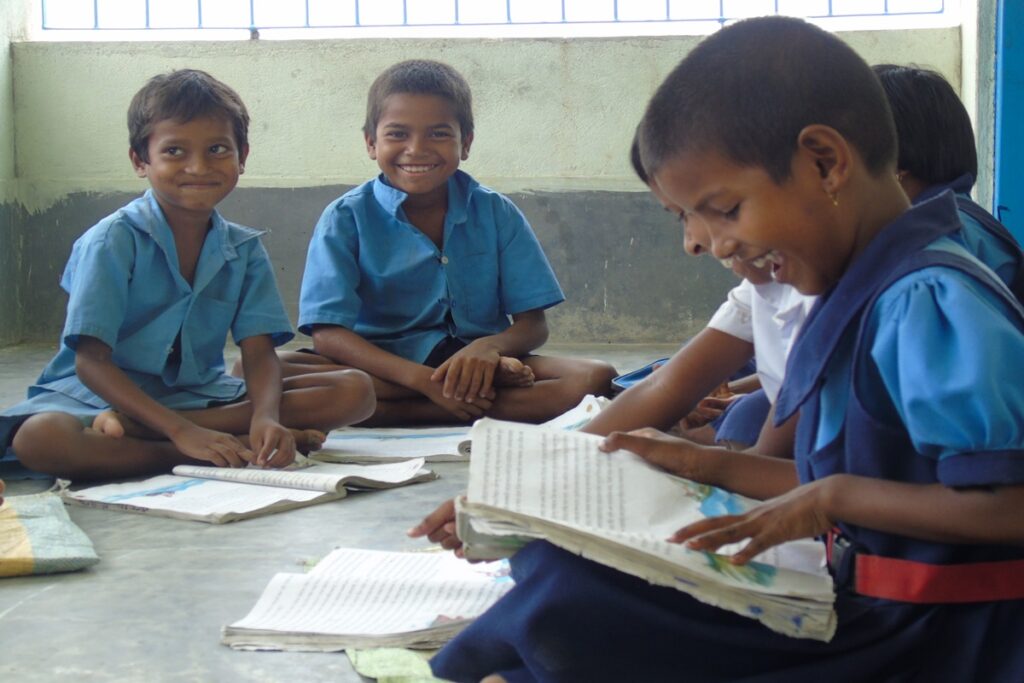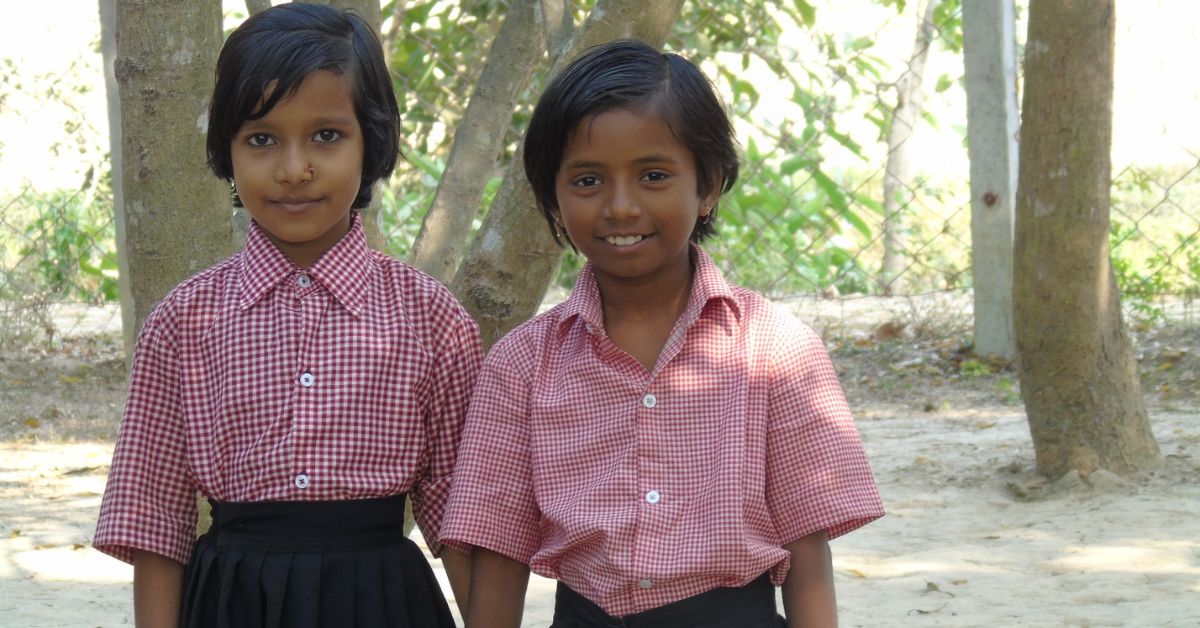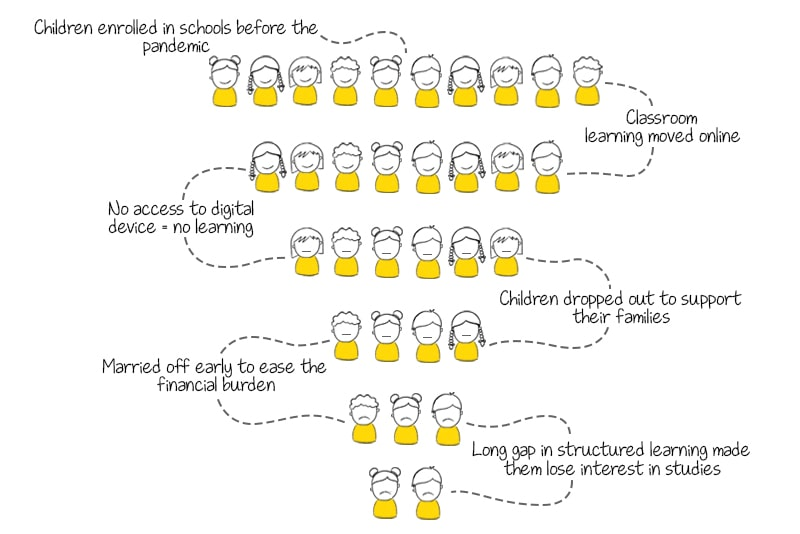
Importance of Conducive Learning Environment for Underprivileged Children in India
Creating a conducive learning environment is crucial for every child, especially those from underprivileged backgrounds. In India, millions of childr....
Read More
All schools were shut during the overwhelmingly difficult pandemic. But after many months of struggle, formal learning has finally resumed in schools. Unfortunately, many children who were enrolled in schools prior to the lockdown are unable to continue their education. This is because many of them dropped out during the gap when the schools were shut. As classrooms shifted to online mode, many underprivileged children could not continue learning as they didn’t have access to digital devices. Some children from marginalized communities dropped out to support their families to stay afloat during the unforeseeable effects of the pandemic. And several others were married off early to ease the financial burden, thus making it impossible for them to return to their studies.

The long gap in structured learning has made students lose interest in their studies. This is why the years to come are even more crucial to preserve and protect child rights. It's critical to provide integral tools and resources to get underprivileged children ready for classroom learning. This will go a long way in assisting them in continuing their education and offer them the opportunity to learn and develop many important life skills.
In the evolving landscape of education, the resounding call for children education to go back to school echoes with significance. Beyond textbooks and classrooms, the importance of this return lies in the holistic development that structured learning environments foster.
Let's delve into the multifaceted reasons why children should embrace the return to school.
The essence of education lies in perpetual learning. Going back to school presents a continuous stream of new knowledge, challenging young minds to explore and expand their intellectual horizons. According to UNESCO, globally, over 300 million students faced disruptions in learning due to the pandemic, emphasizing the urgency of returning to the structured environment of schools.
Schools serve as hubs of diverse learning experiences. Interaction with teachers, peers, and a myriad of subjects cultivates social skills and a broader worldview. The return to school provides children with the opportunity to engage in dynamic conversations, fostering curiosity and empathy crucial for their personal and social development.
Extracurricular activities are integral to a child's holistic growth. Whether in sports, arts, or clubs, these activities instil discipline, teamwork, and leadership skills. A study by the U.S. The Department of Education found that students engaged in extracurricular activities show improved academic performance, emphasizing the positive impact of these engagements on overall development.
The structured setting of a classroom facilitates disciplined learning, laying the foundation for practical application. Beyond theoretical knowledge, students acquire problem-solving skills and the ability to adapt to real-world scenarios. The return to school ensures a balance between theoretical understanding and practical application, preparing children for the complexities of life.
One of the paramount reasons for children to return to school is the pressing need to address the learning loss exacerbated by the pandemic. The World Bank estimates that global school closures could result in a loss of over $10 trillion in lifetime earnings for current students, highlighting the urgency of reestablishing structured learning environments.
Schools play a pivotal role in the social and emotional development of children. Beyond academic achievements, they provide a platform for building resilience, emotional intelligence, and interpersonal skills. The return to school nurtures these aspects, contributing to the overall well-being of students.
The closure of schools disproportionately affected vulnerable populations, exacerbating educational inequalities. UNESCO reports that around 23.8 million additional children and youth in low-income countries are at risk of dropping out or not having access to education post-pandemic. Returning to school becomes a catalyst for re-establishing equity in educational opportunities.
The challenges of the future demand a generation equipped with critical thinking, adaptability, and problem-solving skills. Going back to school ensures that children receive the foundational education necessary to confront and navigate the complexities of the evolving world.
At CRY, we are working hard to ensure that every child returns to school and reconnects with their school education to give them the necessary confidence to go #BackToSchool:
• Conducting study sessions to supplement classroom learning for students using digital tablets under the supervision of qualified teachers
• Besides ensuring child-centred education, assisting children in expanding their minds through exposure to pertinent and useful skills and content through digital platforms
• Aiding enrollment initiatives in villages to get the children in school and support their ongoing education
• Carrying out creative and interactive activities like story-telling, singing, and dancing, among others, to help improve the cognitive abilities of children
• Holding awareness campaigns for the parents and discussing the negative implications of dropping out of school, child marriage, child labour, and trafficking
• Preventing school dropouts by ensuring that the facilities at the schools are maintained
• Celebrating important days like World Environment Day, World Yoga Day etc to create awareness of different causes.
• Providing guidance and career counselling to class X and XII pass-outs.
Through the Bridge Learning initiative, CRY has reached 24,800 children. But we still have a long way to go to provide support classes and ensure 1,00,000 children stay in school and reimagine their future.
The imperative return to school transcends conventional notions of education. It is a holistic approach to nurturing well-rounded individuals capable of not just regurgitating information but critically analyzing, adapting, and contributing meaningfully to society. As we advocate for the return to school, let's recognize it as an investment in the future – a future where every child is empowered with the knowledge, skills, and resilience to thrive in a rapidly changing world.
India’s underprivileged children need our attention urgently. Your generous contribution to CRY can help them fulfil their dreams and reach their truest potential. Donate for children’s education in India and give underprivileged children a chance at a brighter future!